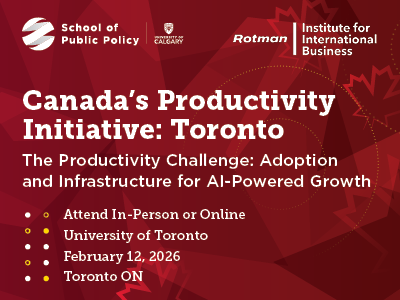Does the “East Coast Lifestyle” provide a cultural explanation for slower growth in the Maritimes?
New Brunswick, Nova Scotia and PEI have long had lower incomes than residents of provinces to their west. Since moving to New Brunswick from Alberta I have been surprised by two features of the public discussion of the reasons for the regional disparity. First, cultural explanations for the lower incomes seem to be widely accepted in the region. Residents have a culture of “defeatism”; are unwilling to take risk; lack entrepreneurial spirit and are “too comfortable” with the status quo. Second, almost all discussion is around finding labour supply through immigration and removing entitlements and other labour disincentives. There is almost no discussion of how to promote private sector investment which may be the biggest contrast with policy discussions in the west.
We decided to test the hypothesis that culture explains why New Brunswick is a “have less” province. Following the lead of Mancur Olson Jr and George Borjas, we looked at the labour market outcomes of New Brunswick residents who migrated to Alberta and Saskatchewan, and of those who subsequently returned to New Brunswick. If culture explains lower productivity of New Brunswick residents then we would expect to see migrants to Alberta and Saskatchewan earning as little as they did back home in New Brunswick. If a lack of labour demand due to factors like a lack of capital explains the lower incomes in New Brunswick, then we would expect to see New Brunswick migrants earning much more while they are in the west than when they are working at home. The cultural explanation for low incomes in New Brunswick says it is due to the people, whereas the labour demand explanation says it’s due to the place.
New Brunswick (NB) experiences substantial outmigration of its residents and since 2003, Alberta and Saskachewan (AB/SK) have emerged as top destinations for NB outmigrants. The correlates of inter-provincial migration have been studied but less is known about the correlates of return migration and the earnings “consequences” of return migration for the migrant and the home economy. To the extent that the oil price collapses of 2008 and 2014 were unanticipated, migration to AB/SK from NB, and return migration to NB, may reflect exogenous variation in labour market opportunities affording an opportunity to identify the causal impacts of migration for outmigrants, return migrants and the NB economy.
Using taxfiler data from Statistics Canada, we investigate whether NB residents who move to Alberta or Saskatchewan (AB/SK) and then return to NB have comparable characteristics and earnings to both workers who remain in AB/SK prior to return migration and workers who remained in NB after return migration. We find that compared to non-migrants, NB migrants to AB/SK are younger, more likely to be male and less likely to be married. The probability of returning to New Brunswick falls with the time spent in AB/SK. Amongst the migrants from NB, those who choose to return to NB are younger, more likely to be male, working in construction and not married.
In terms of earnings before and after migration, it appears that migration from NB to Alberta and Saskatchewan was equally advantageous in terms of earnings gains for male return migrants and permanent migrants prior to return to New Brunswick. Female return migrants did not have the same earnings gain as female permanent migrants in Alberta/Saskatchewan. But, what is clear is that the human capital embodied in New Brunswick migrants is worth much more in the west suggesting that their “culture” does not impair their productivity.
The surprising result is that the return migrants are not showing any earnings gains in excess of those of NB’ers who never left the province. The productivity of human capital in New Brunswick is not reflective of the person, it is determined by labour demand in New Brunswick. This runs counter to the expectation that often underlies population policies that increasing the labour supply can cause growth of the economy but agrees with the OECD assessment that return migration is not likely to drive economic growth. Instead, return migration is likely symptomatic of the opportunities being created in the home economy. Growth in population and GDP in NB is more likely to occur from strategies focused on promoting investment and technical progress.
Our results on the earnings impacts of return migration suggests that policies aimed at increasing marketable human capital through education levels, training and experience will not cause higher incomes of the individuals in NB. Policies aimed at increasing the number of return migrants or immigrants will not cause growth of the economy. What will increase GDP, immigration and return migration in NB are policies and institutions aimed at increasing labour demand through increased investment in capital stocks and technical progress.


